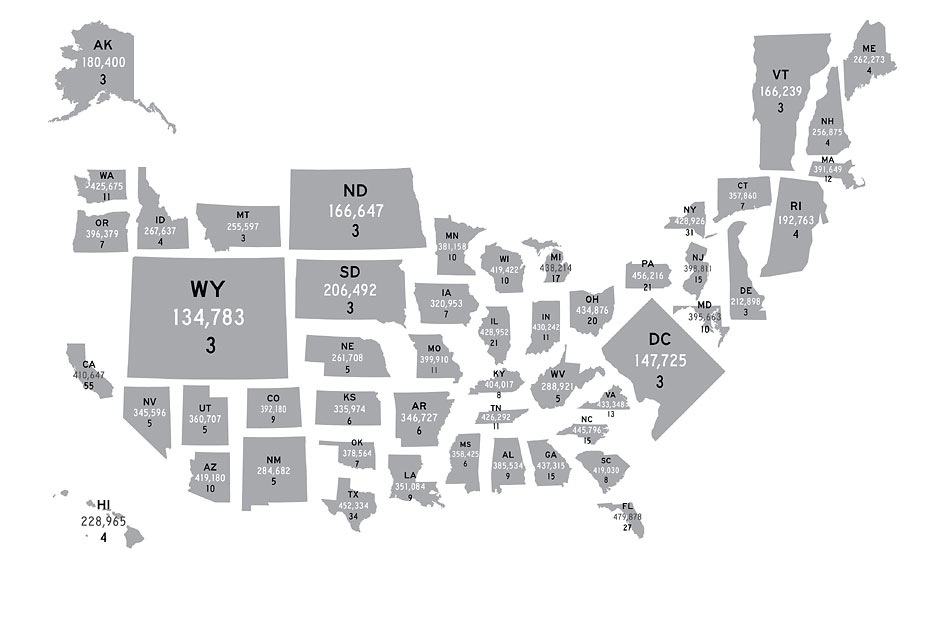That was the heading for this NY Times chart:
This map shows each state re-sized in proportion to the relative influence of the individual voters who live there. The numbers indicate the total delegates to the Electoral College from each state, and how many eligible voters a single delegate from each state represents.
The accompanying article describes the usual small-state Electoral College bias, but goes on from there:
But there is a second, less obvious distortion to the “one person, one vote” principle. Seats in the House of Representatives are apportioned according to the number of residents in a given state, not the number of eligible voters. And many residents — children, noncitizens and, in many states, prisoners and felons — do not have the right to vote.
In House races, 10 eligible voters in California, a state with many residents who cannot vote, represent 16 people in the voting booth. In New York and New Jersey, 10 enfranchised residents stand for themselves and five others. (And given that only 60 percent of eligible voters turn out at the polls, the actual figures are even starker.) Of all the states, Vermont comes the closest to the one person, one vote standard. Ten Vermont residents represent 12 people.
The state-to-state difference is dramatic. In fact, though, for many of us, the actual situation is even worse. Voters in California (like me) or in Wyoming, despite the big difference in voting weight as shown in the above map, have approximately zero chance of influencing the outcome of a presidential election, simply because our electors are allocated on a winner-take-all basis, and our states very reliably go for one party or the other.
(A possible fix for this is the National Popular Vote project, but the main subject of this post is the nifty graphic.)

The National Popular Vote bill would guarantee the Presidency to the candidate who receives the most popular votes in all 50 states (and DC).
Every vote would be politically relevant and equal in presidential elections.
The bill would take effect only when enacted, in identical form, by states possessing a majority of the electoral votes—that is, enough electoral votes to elect a President (270 of 538). When the bill comes into effect, all the electoral votes from those states would be awarded to the presidential candidate who receives the most popular votes in all 50 states (and DC).
The bill is currently endorsed by 1,181 state legislators — 439 sponsors (in 47 states) and an additional 742 legislators who have cast recorded votes in favor of the bill.
The National Popular Vote bill has passed 21 state legislative chambers, including one house in Arkansas, Colorado, Maine, North Carolina, and Washington, and both houses in California, Hawaii, Illinois, New Jersey, Maryland, Massachusetts, Rhode Island, and Vermont. The bill has been enacted by Hawaii, Illinois, New Jersey, and Maryland. These four states possess 50 electoral votes — 19% of the 270 necessary to bring the law into effect.
See http://www.NationalPopularVote.com
In fact, NPV passed in the California legislature twice. All we need now is a new governor.